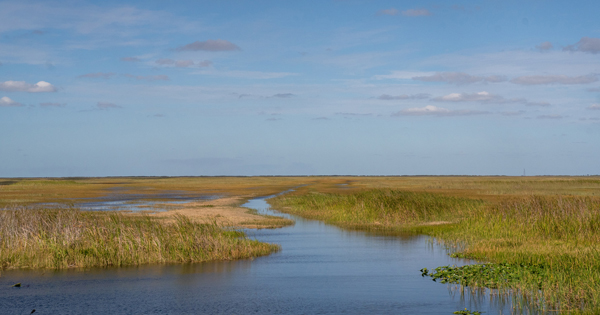
Renowned for its wading birds and wildlife, America’s Everglades is a one-of-a-kind ecosystem that is found nowhere else in the world. From its sawgrass marshes and freshwater ponds to its prairies and forested uplands, this iconic River of Grass is home to dozens of federally threatened and endangered species, including the Florida panther, American crocodile, snail kite and wood stork.
Did you know that Everglades Day is recognized on April 7 of each year to highlight this extraordinary ecosystem and the continued efforts to protect and restore it? This day also honors Marjory Stoneman Douglas on her birthday while emphasizing the importance of conserving this subtropical wilderness.
In celebration of Everglades Day, we are showcasing some interesting facts about this national treasure and the ways we can all enjoy its natural beauty. Sights include:
- Enjoy a Birds Eye View: Shark Valley's 65-foot observation tower provides wonderful views of the sweeping Everglades ecosystem.
- Watch for Birds and Wildlife: Discover over 300 bird species and watch for wildlife that call this ecosystem home. The mix of salt and fresh water makes the Everglades the only place on Earth where alligators and crocodiles exist side by side.
- Watch the Sunset: Located at the southernmost point in mainland Florida, Flamingo offers beautiful sunsets! The area around the Flamingo Visitor Center also provides campground facilities, a public boat ramp, a marina store, and other hiking and canoeing trails.
- Paddle Amongst the Mangroves: Nine Mile Pond in Everglades National Park offers canoeing and kayaking. This scenic trail passes through shallow grassy marsh with scattered mangrove islands.
- Enjoy Activities for Everyone: Everglades National Park is the third largest park in the lower 48 states, covering 2,400 square miles! The diverse habitat allows for a wide variety of recreational activities.
The South Florida Water Management District, together with our federal, state and local partners, continues to advance restoration projects that support the ecological health of our Everglades now and for future generations. Visit SFWMD.gov/Restoration to learn more about the comprehensive effort to protect this unique ecosystem.
